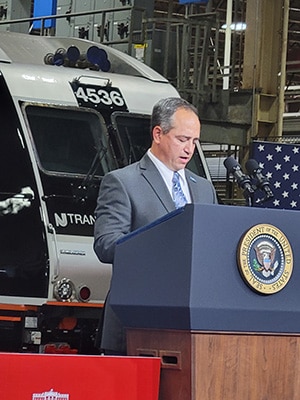Legislation championed by the SMART Transportation Division that toughens penalties on passengers who do harm to transportation workers has passed both chambers of the New Jersey Legislature and has been sent to Gov. Phil Murphy’s (D) desk for his signature.
Assemblyman Daniel R. Benson (D-Dist. 14) and state Sen. Patrick J. Diegnan Jr. (D-Dist. 18) were the driving forces behind the versions of the Motorbus and Passenger Rail Service Employee Violence Prevention Act that ran concurrently in rapid fashion through both chambers of the New Jersey Legislature.
“Transportation workers are far too often subjected to vicious attacks by irate passengers for simply doing their jobs,” said Benson, who serves as chairperson of the Assembly Transportation and Independent Authorities Committee. “Our bus and rail employees must be protected as they fulfill their critical duties on behalf of the hundreds of thousands of commuters in our state.”
On the Republican side, State Sen. Robert R. Singer (R-Dist. 30) also championed the bill in the Senate.
“Unfortunately, there have been many instances where bus and train operators are assaulted by unruly passengers. People who engage in such abhorrent behavior are not only putting the lives of the operators at risk, but also the lives of all the passengers,” he said. “This legislation will significantly increase the penalty for such assaults, and act as a deterrent for future altercations.”
The legislation was crafted in response to incidents when two New Jersey Transit (NJT) employees were assaulted this past year. The Senate version, S-4071, passed unanimously Dec. 20 on a 39-0 vote. The Assembly version, A-6013, passed unanimously with a 76-0 vote on the same day.
While testifying as a proponent of the bills in both chambers, N.J. State Legislative Director Ron Sabol made it clear that it’s past time to toughen enforcement, especially after the on-the-job assaults by passengers on NJT employees.
“We thank legislators for their overwhelming support of this legislation,” Sabol said. “They’ve seen those heinous attacks on our members doing their jobs, stepped up and have done the right thing to protect transportation workers and the public.”
The bill upgrades the penalty for all assaults on a motorbus or autobus operator, the operator’s supervisor and a rail passenger employee. It also empowers NJT, motorbus companies and all rail passenger service providers to ban riders from their transportation services for up to one year if the person commits an assault on a motorbus operator, the operator’s supervisor or a rail passenger employee.
If a deadly weapon was used during the assault, the rider may be banned for life.
“It’s a great bill and could be a blueprint for other states,” National Legislative Director Greg Hynes said. “Congratulations to SLD Sabol and the New Jersey State Legislative Board for their outstanding work.”


 In a press release issued Wednesday, July 10, New Jersey Transit (NJT) announced that attorney Michael Rubin would be the carrier’s first employee court advocate to support operational employees who are victims of on-the-job assaults. The position was created in support of the New Jersey State Legislature’s added protections for front-line transportation workers to the state criminal assault statute.
In a press release issued Wednesday, July 10, New Jersey Transit (NJT) announced that attorney Michael Rubin would be the carrier’s first employee court advocate to support operational employees who are victims of on-the-job assaults. The position was created in support of the New Jersey State Legislature’s added protections for front-line transportation workers to the state criminal assault statute.